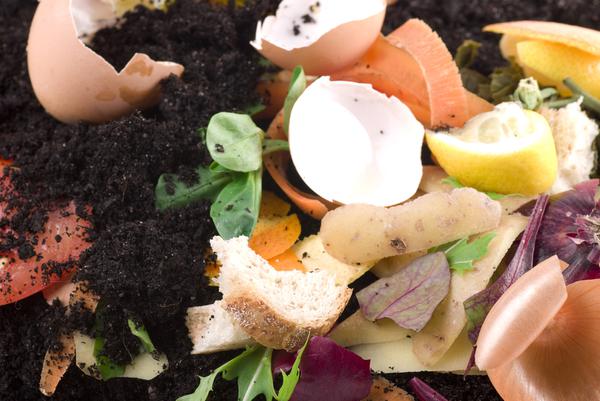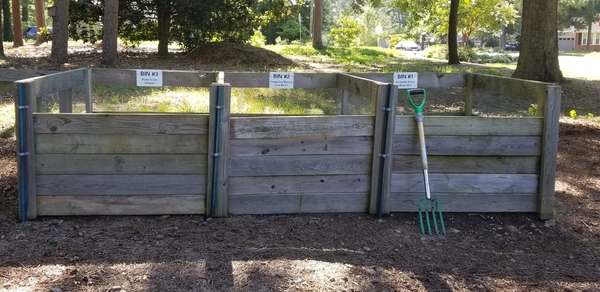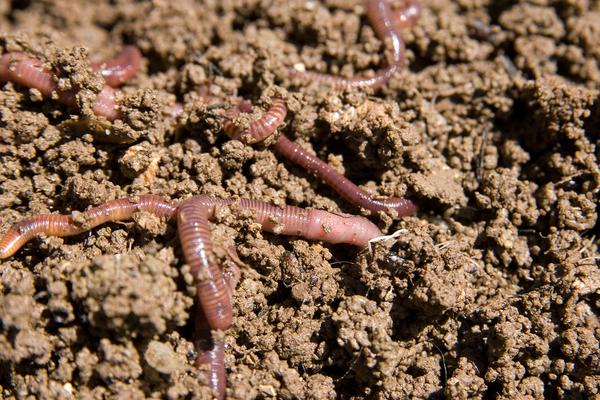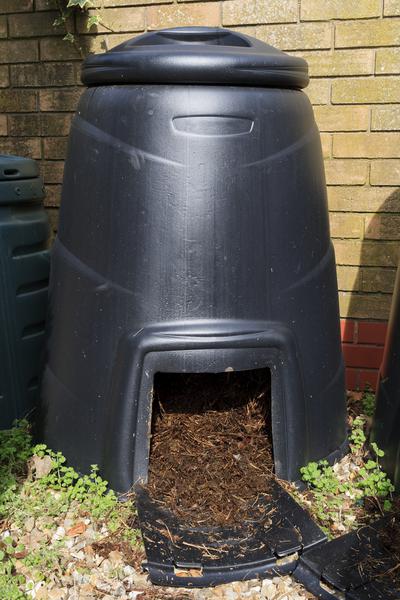Residential camps generate food scraps from meal preparation, plate scrapings, and leftover or spoiled food. Many camps have horses, resulting in manure to manage. Composting and vermicomposting are viable options for managing food scraps, horse manure, and other types of organic waste materials.
Composting is the aerobic decomposition of organic materials by microorganisms under controlled conditions, resulting in a soil-like substance called compost. During composting, microorganisms such as bacteria, fungi, and actinomycetes break down complex organic compounds into carbon dioxide, water, minerals, and stabilized organic matter (compost). The process produces heat, which can destroy pathogens (disease-causing microorganisms, such as e.coli) and weed seeds. To reduce pathogens below detectable concentrations, a compost windrow needs to be maintained at 131°F or higher for 15 days and turned at least five times. Aerated static piles and in-vessel composters must maintain temperatures at 131°F or higher for three days. Most weed seeds are killed at temperatures of 140°F in compost piles.
Vermicomposting is a process that relies on earthworms and microorganisms to help stabilize organic materials and convert them to a valuable soil amendment and source of plant nutrients. Vermicomposting is different from composting: it should not produce heat and does not require turning to keep the system aerated.
North Carolina Composting Regulations
Two North Carolina state agencies in the Department of Environmental Quality (DEQ) issue permits for commercial composting facilities: (1) Division of Waste Management’s (DWM) Solid Waste section regulates facilities that compost food scraps, manure, yard debris, wood waste, paper products, municipal and industrial waste, and sewage sludge, and (2) Division of Water Resources (DWR) regulates facilities that compost manure and other organic materials in large quantities.
If 51 percent or more of the nitrogenous organic material to be composted is food waste, then DWM issues the permit. If 51 percent or more of the waste is manure, then DWR is the regulatory agency issuing the permit.
Nitrogenous wastes contain high amounts of nitrogen. Examples include food waste, manures, coffee grounds, vegetable scraps, grass clippings, hay, alfalfa, and garden waste.
Composting at North Carolina Camps
Residential camps that are planning to set up a compost site should determine if they have mostly food waste or manure to compost. If manure comprises 51 percent or more of the nitrogenous compost mix, the camp will be required to use the composting rules established by DWR. Camps with fewer than 75 horses, however, are exempt from permitting by DWR.
The Division of Waste Management considers camps as educational projects, and a permit is not required if the following criteria are met:
- Compost is less than 1 cubic yard of nitrogenous material per week.
- Sources outside of the camps are not composted.
- Compost product is not used on food crops grown at the camp or distributed to the public, and camp participants are not allowed to take the compost home with them.
Guidelines for Using Manure and Food Waste Compost at Camps
Manure and food waste composts or mixtures can be valuable soil amendments and should be used in practical ways that minimize risks to both plants and humans. Composting is not highly technical, but it is an active process that involves management and oversight to ensure maximum biological activity (decomposition) and pathogen reduction. Failure to properly manage the process can damage crops, contaminate surface water, and introduce pathogens into the food supply. Due to these risks, great caution must be used in making compost application decisions.
We recommend that you follow these guidelines:
- If possible, avoid using manure, food waste, or mixed compost on edible crops. Well-managed compost can be applied to pastures or landscaped areas with minimal risk. Use plant-based (non-food) or purchased “STA-certified” organic matter on the vegetable garden. STA-certified compost has been tested through the Seal of Testing Assurance program of the U.S. Composting Council (details at compostingcouncil.org/sta-benefits.)
- If manure, food waste, or mixed compost must be used on a garden, apply the compost in the fall after the fruits and vegetables are harvested. Applying compost during the growing season dramatically increases the risk of human disease transmission and plant-related problems. It is best to wait 120 days after application until the first crops are harvested. Measuring the sustained temperature of the compost pile is important to ensure that risks are being reduced.
- Be aware of herbicides used on the pasture that may be present in manures. The herbicide active ingredients of greatest concern are picloram, clopyralid, and aminopyralid. These chemicals can remain active in hay, grass clippings, piles of manure, and compost for an unusually long time. This is another reason to consider applying the manure compost only to the pasture.
Composting Methods
There are several methods for composting including:
- Turned windrows
- Aerated static piles
- Bins
- In-vessel
- Vermicomposting
Managing compost systems requires the proper mixing of feedstock material, monitoring temperature and moisture, and providing aeration by either turning or using passive or mechanical systems. A compost system should be tailored to match the size of your waste stream and the physical, topographical, and labor constraints of your operation. For more information about composting, see NC State Extension publication AG-593, Large-Scale Organic Materials Composting. Information about vermicomposting is at on the Vermicomposting page on the Extension Composting portal.
Technical assistance and possible cost-share aid may be available through your local Cooperative Extension center, Soil and Water Conservation District, and USDA Natural Resources Conservation Service (NRCS).
Additional Resources
Publication date: Nov. 28, 2022
AG-773
N.C. Cooperative Extension prohibits discrimination and harassment regardless of age, color, disability, family and marital status, gender identity, national origin, political beliefs, race, religion, sex (including pregnancy), sexual orientation and veteran status.




